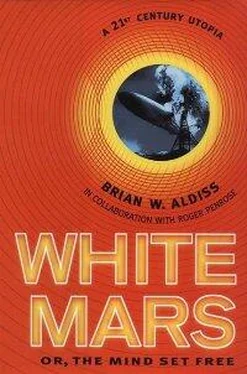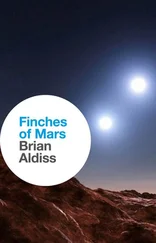Brian Aldiss - White Mars
Здесь есть возможность читать онлайн «Brian Aldiss - White Mars» весь текст электронной книги совершенно бесплатно (целиком полную версию без сокращений). В некоторых случаях можно слушать аудио, скачать через торрент в формате fb2 и присутствует краткое содержание. Год выпуска: 1999, ISBN: 1999, Издательство: Little, Brown UK, Жанр: Фантастика и фэнтези, на английском языке. Описание произведения, (предисловие) а так же отзывы посетителей доступны на портале библиотеки ЛибКат.
- Название:White Mars
- Автор:
- Издательство:Little, Brown UK
- Жанр:
- Год:1999
- ISBN:0-316-85243-0
- Рейтинг книги:5 / 5. Голосов: 1
-
Избранное:Добавить в избранное
- Отзывы:
-
Ваша оценка:
- 100
- 1
- 2
- 3
- 4
- 5
White Mars: краткое содержание, описание и аннотация
Предлагаем к чтению аннотацию, описание, краткое содержание или предисловие (зависит от того, что написал сам автор книги «White Mars»). Если вы не нашли необходимую информацию о книге — напишите в комментариях, мы постараемся отыскать её.
White Mars — читать онлайн бесплатно полную книгу (весь текст) целиком
Ниже представлен текст книги, разбитый по страницам. Система сохранения места последней прочитанной страницы, позволяет с удобством читать онлайн бесплатно книгу «White Mars», без необходимости каждый раз заново искать на чём Вы остановились. Поставьте закладку, и сможете в любой момент перейти на страницу, на которой закончили чтение.
Интервал:
Закладка:
He switched off the projection. The scatter of smudges died in their tracks.
The Icelandic physicist, Iki Bengtsoen, showed that when Einstein’s theory of gravitation—already confirmed to an unprecedented degree of accuracy—was appropriately incorporated into the Chin-Hawkwood smudge theory, it became obvious that the energies of all the different smudges, alpha, beta, gamma and so on, did not just increase indefinitely, sans limit, but converged on the Planck energy limit.
“You see what this implies? All would be resolved if just a single experiment could be devised to explore the ‘ultimate’ smudge, that limiting smudge, where all the lower energy smudges are supposed to converge. It’s this putative ultimate smudge we call the Omega Smudge.”
Euclid. “So we have got to it at last.” He maintained an expression of goodwill. “But maybe you can explain how an experiment out here, on Mars, can be of particular use in finding this Flying Dutchman of a smudge—supposing it to exist at all.”
“That’s where our other breakthrough comes in. Harrison Rosewall argued convincingly that a completely different kind of detector could be used to find this Omega Smudge, supposing it to exist at all.
“This involves the phenomenon known as ‘hidden symmetry’.”
Euclid: “And what might that be?”
Jon stood gazing at the low ceiling, as if seeking inspiration. Then he said, “Every part of the explanation takes us deeper. These facts should have been part of everyone’s education, rather than learning about past wars and histories of ancient nations. Well, I don’t want to go into details, Euclid, but a hidden symmetry is a sort of theoretical symmetry which is dual in a certain sense, to a more manifest symmetry than might exist in theory. The idea goes back to some hypotheses popular late last century, although at that time the correct context for the hidden-symmetry idea was not found.
“What was important for Rosewall’s scheme was that there can be things called monopoles associated with hidden-symmetry fields.
“A magnetic monopole would be a particle that has only a magnetic north pole or south pole assigned to it. As you know, an ordinary ferroperm magnet has a north pole at one end and a south pole at the other. Neither north nor south poles exist singly.
“But the great twentieth-century physicist, Paul Dirac, showed that the charge values had to be integer multiples of something. If you could find even a single example of a separate north or south pole, then—as we have since discovered to be the case—all electric charges would have to come in whole-number multiples of a basic charge.
“So, a number of years later, experimenters set to work to find such magnetic monopoles. If just one was found, then a major part of the mystery of electric charge would be solved. One group of experimenters even argued that the most likely place to find these things would be inside oysters. Of which, as we know, there’s a considerable shortage on Mars.”
Euclid: “Any luck?”
“No. No one has ever found a magnetic monopole, even to this day. But, in Rosewall’s case, the hidden symmetry refers to a dual on the gravitational field. Rosewall made an impressive case that a hidden-symmetry gravitational monopole—known as a HIGMO— ought actually to exist. In fact there is a solution to the Einstein gravitational equations—found in the early 1960s, I believe—which describes the classical version of this monopole.
“This was Rosewall’s brainwave. He realised that if you built a large ring-shaped tube, filled with an appropriate superfluid—argon 36 is what we use, under reduced pressure—then whenever a HIGMO passed through the ring, it would be detectable—just barely detectable—as a kind of ‘glitch’ appearing in the superfluid.”
A voice from the audience asked, “Why argon 36 and not 40?”
“Proton and neutron numbers are equal in argon 36, which underlies the reason for its remarkable superfluidity under reduced pressure. A technical advantage is the low pressure of the Martian atmosphere. Fortunately, argon 36 is not radioactive. Okay?”
At this point, he projected a vidslide of a scene I recognised. There lay the massive inflated tube, protected by its lid. There stood Dreiser, delivering his little speech. I had been a part of that historic scene!
“Obviously, this is a large-scale but delicate experiment. No other disturbances of any kind must affect the super-fluid in the tube. You have to do the best you can to shield the superfluid from external vibrations, because any significant outside activity is liable to ruin the experiment.
“No place on Earth is going to be remotely quiet enough for such an experiment. Never mind human activity, the magma under Earth’s crust is itself active, like a giant tummy rumbling. Earth is an excitable planet.”
Euclid: “What about Luna?”
“The Moon proved no longer possible. Too much tourist activity and mining was already taking place. Maybe forty years ago the Moon could still have been used, but not now, certainly not since they began building the transcore subway.
“But Mars … Mars is ideal for the Omega Smudge experiment. No moving tectonic plates, vulcanism dead … That is, it’s ideal provided that human activity is kept down to present levels.”
Euclid: “No terraforming?”
Thorgeson laughed. “The UN did a trade-off. No terraforming for a few years. The hidden agenda was that this would give a breathing space for the Omega Smudge experiment. The gun at our heads is that we have to get results.”
At this there were rumblings from the audience, and an angry voice called, “So how long is ‘a few years’? Tell us!”
After a moment’s pause, Thorgeson said, “There was to be a stand-off of thirty years—four years from now—before they began to bombard the Martian surface with CFC gases, to start the warming-up process. This was the deal pushed through by Thomas Gunther.”
This statement provoked angry interjections from the audience. Thorgeson calmed things down with a wave of his hand.
“Obviously the collapse of EUPACUS has altered all such arrangements.
“The experiment we’re now getting under way involves only a relatively small ring, sixty kilometres in diameter. Will we discover any HIGMOs? That depends on the HIGMO density in the universe, of which there are only estimates so far. We need results. Otherwise—who knows—the terraformers take over, the CFC gases rain down…”
“Get on with it, then!” came a shout from the audience, followed by roars of support.
Thorgeson said, “The terrestrial economy is still in meltdown. Don’t worry.
“Our present experiment is basically a pilot project, partly to test out how we work in adverse conditions. Maybe we can manage with this. If not, we hope to build a superfluid ring around the entire planet.”
“Another way of ruining Mars!” yelled a voice.
“We need to solve the problem at last. With the planet ringed, the answer to the vexed question of mass will finally be answered. Maybe Mars was formed precisely to enable us to find that solution.”
“Victorianism!” came a cry from a now restive audience.
Thorgeson answered this cry directly. “Okay, tell me what else is Mars good for? You invited me here. Listen to what I have to say. I’ll take sensible questions afterwards. Till then, keep quiet, please.”
As if to back him up, Euclid spoke. “Say why it is so important to solve the mystery of mass. If a few physicists satisfy their curiosity in this respect, what good does that do ordinary people?”
“It is always difficult to justify curiosity-driven research in terms of its ultimate benefit to society. We can’t tell ahead of time. Nevertheless the effect of such research, which seems entirely abstract to the lay person, can be tremendous. An obvious example is Alan Turing’s analysis of theoretical computing machines done in the 1930s. It changed the world in which we live. We are on Mars because of it.”
Читать дальшеИнтервал:
Закладка:
Похожие книги на «White Mars»
Представляем Вашему вниманию похожие книги на «White Mars» списком для выбора. Мы отобрали схожую по названию и смыслу литературу в надежде предоставить читателям больше вариантов отыскать новые, интересные, ещё непрочитанные произведения.
Обсуждение, отзывы о книге «White Mars» и просто собственные мнения читателей. Оставьте ваши комментарии, напишите, что Вы думаете о произведении, его смысле или главных героях. Укажите что конкретно понравилось, а что нет, и почему Вы так считаете.










